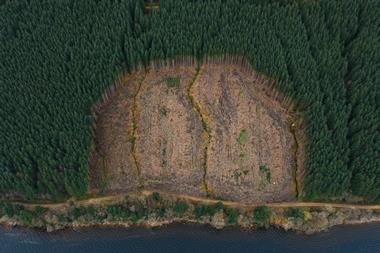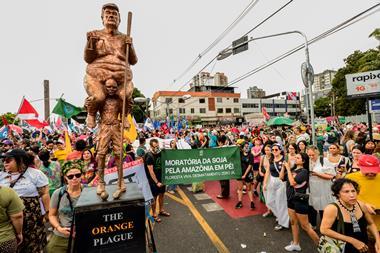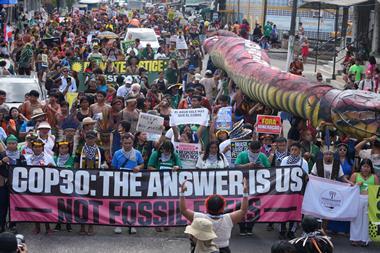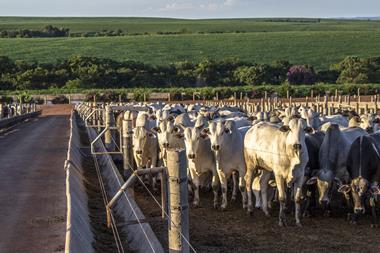
The European Commission has performed a u-turn on plans to delay its flagship Deforestation Regulation for a second time and will now press ahead with a “simplified” version of the policy from 30 December.
The rollout of the regulation had already been delayed by a year when European Commissioner for the environment Jessika Roswall announced proposals for a further one-year wait on 23 September, citing “IT issues”.
The move provoked outcry from climate campaign groups, plus brands such as Nestlé, Mars Wrigley and Ferrero – which insisted they were on track for its planned rollout at the end of this year for larger businesses and next June for small and micro businesses.
Roswall had insisted the delay was not linked to the changing political backdrop within the EU. Her move to delay was instead driven by operational difficulties in rolling out the EUDR, she said. It remained a “key initiative to fight deforestation, and we are still very committed to continue to fight deforestation”.
But after weeks of uncertainty, the European Commission yesterday announced it was now proposing “targeted simplifications” to “ensure the timely implementation of EUDR”, as had been planned, from the end of this year.
Small and micro operators will now have until 30 December 2026 to comply with the regulation, while larger businesses will also be given a six-month “grace period” to comply, taking their implementation date to June 2026.
Read more: What’s behind the latest delay to the EU’s flagship Deforestation Regulation?
Processes will also be simplified so that retailers, traders or manufacturers using one of the seven commodities linked to deforestation under the EUDR on the EU market (aka downstream companies) will not now have to submit a due diligence statement.
“With this streamlining, only one submission in the EUDR IT system at the entry point in the market will be required for the entire supply chain,” the EC said.
Reporting obligations would be focused instead on the operators first placing the products on the market. For example, cocoa beans would need only one statement to be submitted by the importer placing them on the EU market, rather than downstream manufacturers of chocolate products.
Micro and small primary operators, meanwhile, would only submit “a simple, one-off declaration in the EUDR IT system”, doing away with an obligation for regular submissions of due diligence statements.
The proposals – which will need to be ratified by the European Parliament and Council of the EU – aimed to ensure that the IT system “can sustain the level of expected loads”, the EC said.
A ‘shameful surrender’
However, they have also drawn criticism from campaign groups, who said the move would “water down” the anti-deforestation regulation.
The World Wide Fund for Nature called the proposals a “shameful surrender to political pressure”, which changed the regulation “at its core”.
“Weakening the law now only punishes companies that have already invested in compliance and sustainability,” rather than those who were ready for it, the group added.
“The timing of this decision, just weeks before COP30, calls into question the EU’s credibility as a global leader on environmental protection and stalls momentum towards deforestation-free supply chains,” the WWF said.
Nestlé, Mars Wrigley and Ferrero call for EUDR delay reversal
“Today’s proposal shows where the obstacles to the application of the EU deforestation law really are – spoiler alert: not in the IT system,” said Greenpeace EU legal strategist Andrea Carta. “The Commission caved in to lobbying and political pressure and agreed to exempt EU manufacturers, as well as the EU forestry and the agriculture sector, from reporting obligations,” she added.
“This comes on the same day in which the conservatives and the far right in the European Parliament torpedoed the EU Forest Monitoring Law, showing that EU conservatives lack the courage to admit that European forests are in danger and to act to protect them.”
Elsewhere, Mighty Earth also questioned whether the proposals would open up the revised regulation to abuse.
“We’re glad to hear the European Commission has finally gotten off hold with its tech support team, grappled with its IT issues, and for the most part this world-beating legislation will be enforced on time from 30 December”, said Isabel Fernandez, a senior consultant at the campaign group.
“However, exempting due diligence for downstream operators and traders creates a major blind spot in the EUDR framework,” she warned.
“This makes it very difficult and resource-intensive for member state agencies to track down non-compliant products already circulating on the EU market – especially when they are traded across member state borders.”
The European Parliament, Council, and the Commission now needed to ensure the proposed six-month delay in penalties for all operators was clearly communicated and implemented transparently, she urged.
“In a climate and nature emergency, with forests falling fast there is no more time for dress rehearsals. It’s showtime.”
Significant financial penalties can be imposed under the regulation, with a maximum fine stretching to at least 4% of a company’s total annual EU turnover – plus a ban on doing business with the bloc.



















No comments yet